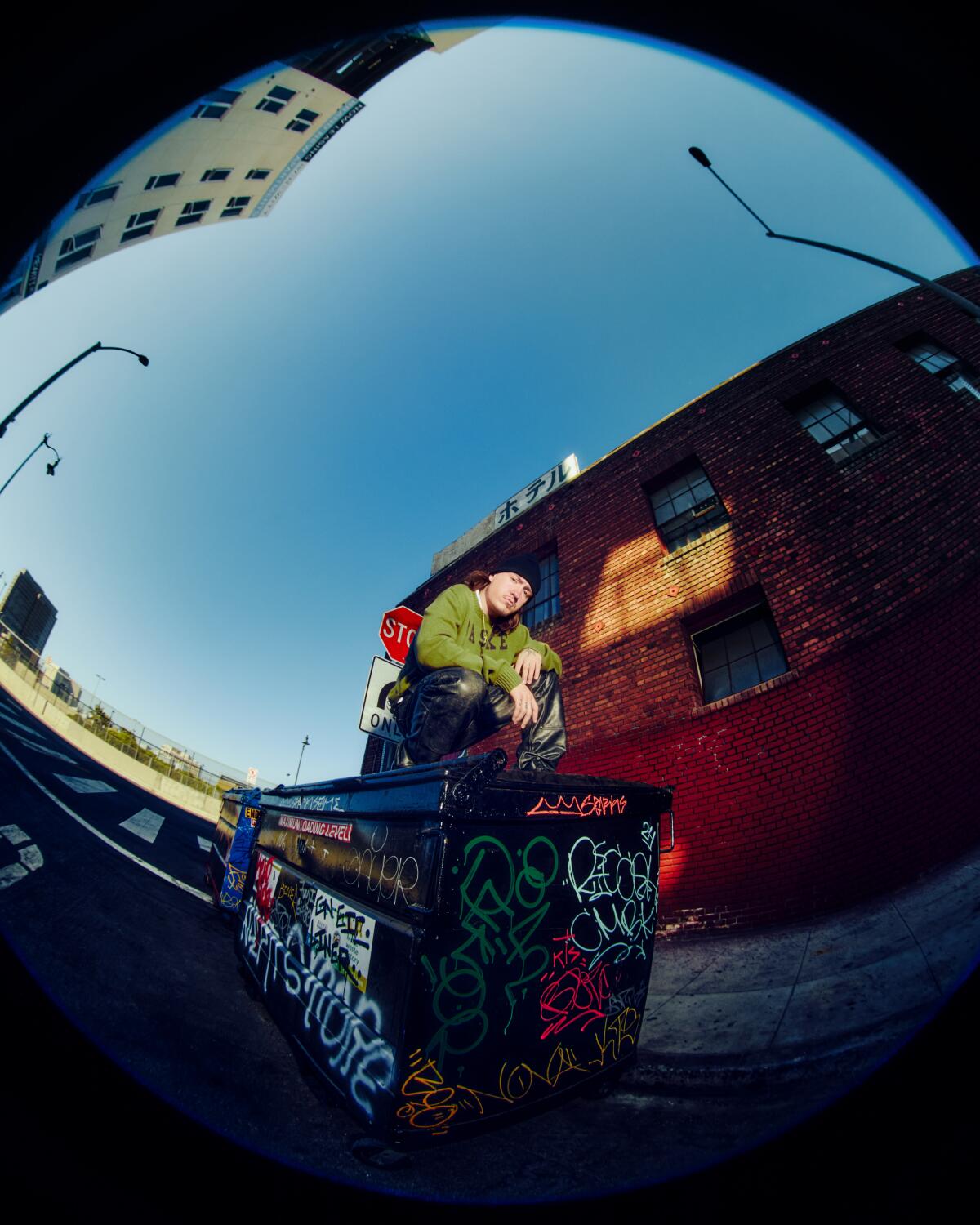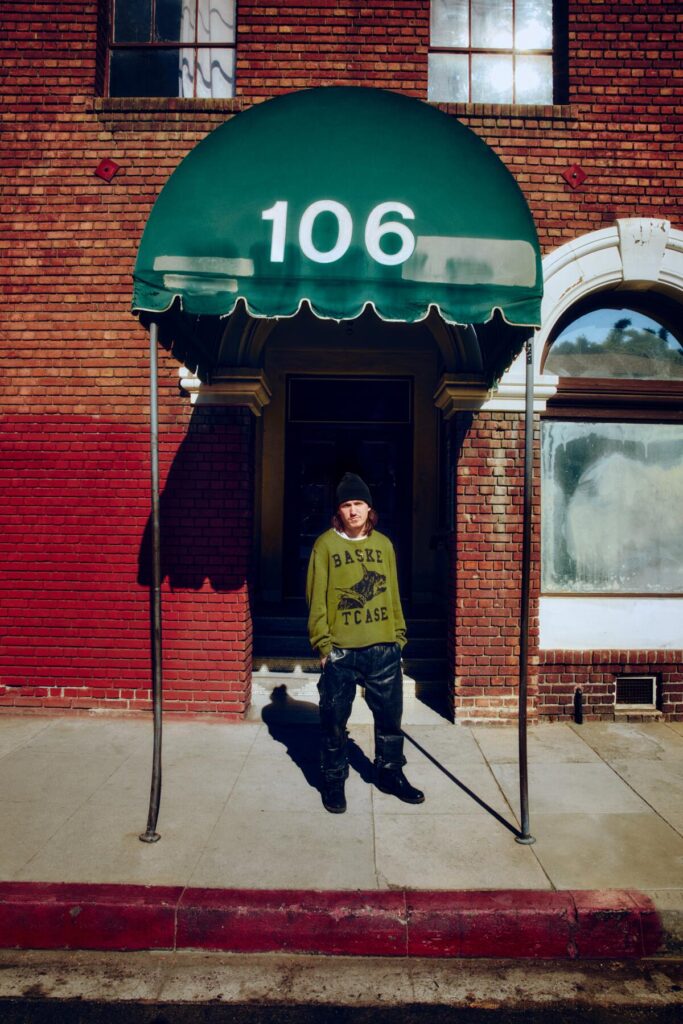When Tommy Richman moved to Los Angeles in 2022 — moved back here, that is, after an unsuccessful earlier attempt led to a retreat to his mom’s basement in Woodbridge, Va. — he lived in a grubby hostel in Little Tokyo that cost him $26 a night.
“Bro, it was bad,” the singer says now. “There was a guy a few rooms down from me who had a hammer, and when you’d walk by, he’d hammer the door just to scare people.” He recalls the time a friend picked him up and asked if he could use the shared bathroom. “I was like, ‘Nah, you don’t want to — just piss outside.’”
In spite of the bleak conditions, Richman — whose mutant R&B song “Million Dollar Baby” was one of this past summer’s biggest hits — seems almost warmly nostalgic as he wanders into the building’s lobby on a recent afternoon.
“I remember this smell,” he says, plopping down on a ratty sofa beneath a faded oil painting. Dressed in baggy leather pants, his greasy hair tucked under a knit cap, the 24-year-old looks around the place like it’s the scene of some previous life — which is more or less the case, given how much has happened in the 18 months since he was sleeping here.
In early May, “Million Dollar Baby,” which took off on TikTok as soon as Richman released it, rocketed onto Billboard’s Hot 100 at No. 2, just behind Taylor Swift’s “Fortnight”; 21 weeks later, the song is still inside the chart’s top 15 thanks to streams and digital sales that brought in more than $63,000 in the week that ended Sept. 12, according to the music-industry trade journal Hits.
“This s— is really possible,” Richman wrote this week on X. “Just bought my mom a house. Off sum soundz.”
Now, the singer with the rough-edged falsetto is releasing a debut album, “Coyote,” that he hopes will parlay the success of “Million Dollar Baby” into the kind of long-term career that’s eluded plenty of other pop acts with out-of-nowhere TikTok hits. (Pour out a little for Arizona Zervas post-“Roxanne.”)
Tommy Richman outside a hostel where he used to live in Los Angeles.
(Kayla James / For The Times)
“TikTok, it’s a great platform — my life’s changed off of it,” Richman says of the hugely popular video-sharing app. “But when songs blow up on TikTok, there’s a stigma that comes with it, like your song is a ringtone. That’s not who I am. I’m trying to make living, breathing albums — works of art, man.”
“Coyote” lends some credence to his argument. Full of woozy disco beats and warped electro-soul textures, the 11-track LP showcases a sense of songcraft that evokes Lionel Richie and “Dirty Mind”-era Prince; one track is titled “Whitney” because “it just sounded like some Whitney Houston type of song,” says Richman’s friend and producer Jonah Roy, who worked closely with him on the album after the two connected “through the DMs,” as Roy puts it, a couple of years ago.
Inspired by the immersive world-building of peak-era Kanye West and by the retro-futuristic production style of his fellow Virginia native Pharrell Williams, Richman says his goal with “Coyote” was creating “this dark, glittery, spacey funk journey” — a mission that also involves a handful of visually striking music videos, including the clip for his song “Devil Is a Lie,” which was shot in part at the Hollywood topless club Cheetah’s.
“Great spot,” Richman says, recalling a recent visit with Shaboozey, the ascendant country-rap star whose smash “A Bar Song (Tipsy)” is in its 11th week atop the Hot 100. “It was Shaboozey’s birthday, OK, and he had something at Poppy. Hate that place — it’s the worst,” he adds of the bottle-service joint on La Cienega. “Everybody’s packed in like sardines. My friends are looking at me, and I’m like, ‘I’m sorry.’ Then Shaboozey says, ‘We’re going to Cheetah’s!’”

Richman’s vibe in his videos — and in a rowdy live gig last week at the Roxy that found him ripping off his T-shirt as he performed “Million Dollar Baby” (then performed the song again) — is a little messy, a little seamy, a little off in a way that shares something with some of the year’s other breakout pop acts, from Chappell Roan to Charli XCX. The phrase “dirtbag Justin Timberlake” comes to mind.
“That’s what you get?” Richman asks with a laugh at the hostel. “I mean, it is a little grimy. ‘Dirtbag Justin Timberlake,’” he repeats, rolling the words around his mind. “That’s funny as s—, bro.”
It’s quite a contrast with the career Richman once envisioned as a student at New York’s Manhattan School of Music, where he studied opera after high school and where he’s pretty sure he ranked among the “the top, like, three tenors my age.” Told his new music doesn’t betray much of his operatic training, he says, “That’s good — I’m not trying to be Josh Groban. I don’t want it to sound too technical.”
Richman, who started posting songs online as a teenager, ended up in L.A. the first time after abandoning music school and taking up an acquaintance’s offer of a spare room in Glendale so that he could start networking. “Then that guy had a falling-out with his roommate,” he says now. “I was like the kid with the divorced parents, so I went back to Virginia.” When he returned, he met the R&B singer Brent Faiyaz, who signed Richman to his ISO Supremacy label last year and took him on tour as an opening act.
Richman, Roy and several other musicians and producers in their tight-knit crew soon started assembling “Coyote,” recording “anywhere and everywhere” they could, the singer says. He cut the vocals for the glistening, Michael Jackson-ish “Temptations” in “a f—ing closet” and sang “Thought You Were the One,” a silky slow jam, while on vacation in Hawaii with his mother. “She was sleeping, and I was recording in the bathroom,” says the singer, whose tattoos include one of his mom’s name, Jeni.
Asked why he thinks “Million Dollar Baby” exploded on TikTok, he says he suspects it had to do with the “organic” quality of the video snippet he initially posted on the platform showing him and his collaborators working on the song in the studio.

Tommy Richman studied opera singing before his song “Million Dollar Baby” blew up on TikTok.
(Kayla James / For The Times)
Roy agrees: “It was a moment in time, and people saw that it was real,” the producer says. “They saw Tommy dancing, and it pans over to me and I’m wearing a sweatshirt and my hair’s all messed up. It was just: ‘Oh, these are some guys making some great stuff.’”
Yet Richman acknowledges that the essence of TikTok virality remains a mystery. “This was literally off an algorithm,” he says. “It was like some weird glitch in the system.”
Adjusting to the first stages of fame is going OK, according to Richman, largely because he keeps a “very tight” circle of friends. “I really only talk to like 13 people,” he says, though his phone does buzz every once in a while with an unexpected message from someone from his past. “My sixth-grade girlfriend reached out: ‘Hey, I’m proud of you!’ I’m like, Grace Fisher?!”
He also got to work with Pharrell, whom he calls his biggest influence, on a recent trip to Paris. “We met him at Louis Vuitton,” where the producer holds down a second job as a creative director, “on the Saturday morning of Fashion Week,” Richman says. “We were there for like two hours, playing beats and f—ing around on some new s—. It was sick.”

Richman’s name has cropped up in prognostications regarding February’s Grammy Awards, particularly as a contender for best new artist. He’d happily welcome a nomination, he says, but insists, “I don’t care about winning. Lot of politics involved in actually winning a Grammy.” Regardless, the many classic R&B references on “Coyote” could endear him to older voters drawn to Grammy faves like Bruno Mars and Victoria Monét.
Notes Roy regarding the singer’s Roxy show: “I was meeting people in there that looked like my mom’s age, and they were there as fans.”
Richman says he’s already at work on his next two albums, one of which will lean toward alternative rock and the other toward hip-hop. In a funny way, the unpredictability of what makes a hit in the age of TikTok is a kind of liberating force, he figures.
“The fact that none of these record labels know what they’re talking about is how I know I’ll be fine,” he says. “I can put out whatever I want, and the public will decide if it goes crazy or not.”

